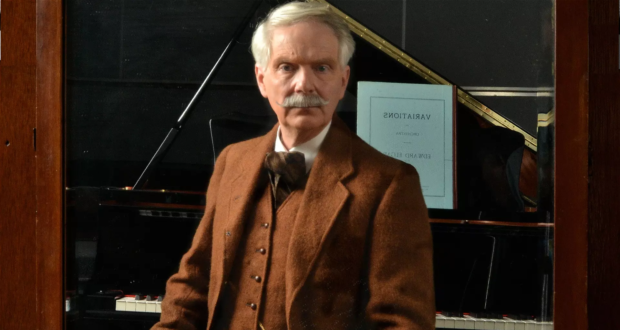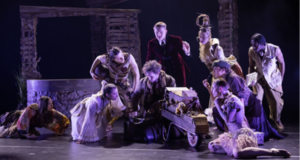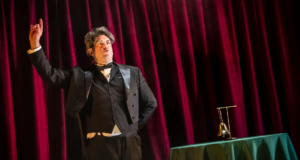St John The Baptist Church
Despite a charming, charismatic performance by Michael Lunts as Edward Elgar, this one-man show doesn't quite integrate its two storytelling devices.Summary
Rating
Ok
Actor/pianist Michael Lunts has made a career performing solo, salon-sized shows about the lives and music of great composers and songwriters. He is a charming, charismatic presence, with an admirable fluidity on the piano. His performances of flamboyant characters like Chopin, George Sand, or Noel Coward must delight an intimate audience. In The Enigma of Edward Elgar Lunts is pushing his boundaries as writer and performer: the melancholy, widowed Elgar is a harder sell than Coward’s fizzy joy. While the production requires some reimagining, there is much about it to recommend.
Lunts, portraying Elgar with tweed and a walrus-y moustache, alternates between two storytelling worlds. The first is a straight-to-the-audience monologue about Elgar’s life and family, his relationship to class, and, most importantly, his deceased wife. The second is at the piano, as Lunts (still as Elgar) leads us through the “Enigma Variations” (with bits of the cello concerto and “Salut d’Amour” thrown in to elicit appreciative nods from the Elgar superfans).
Both parts of the show have their strengths, but they remain frustratingly segregated. The monologue is an effective portrait of an outsider who abruptly finds himself widowed, older, and isolated. Lunts is a fine storyteller, and his plummy voice, thoughtful line deliveries, and a few sound design tricks keep us engaged. Yet the story he tells lacks architecture, internal conflict, and catharsis. Lunts’ Elgar begins the evening morose and finishes more so, without having come to terms with his issues; in one scene, Elgar defends his extra-marital affairs as “necessary for the artistic muse” – a feeble justification for the pain it caused his wife, and one the production doesn’t probe deeper.
When Lunts is at the piano, the show becomes a kind of costumed pre-concert lecture. Each of Elgar’s variations is a portrait (or parody) of someone close to him, and the depth and poetry Lunts finds in the monologue are mostly absent from these summaries, which are trivia-stuffed and Wikipedia-thin by comparison. The result is that the piano sections feel dutiful rather than inevitable, with a palpable “well, let’s carry on!” energy as he reaches the double-digit variations.
The most cohesive moment comes with the “Dorabella” variation, a portrait of a charming, stuttering girl who would dance in Elgar’s studio. This is a rich, touching portrayal of an effervescent figure, and Lunts’ description of the variation reveals Elgar both musicologically and psychologically. The moment is transporting, alive with the complexity and beauty of Elgar’s memory and artistry. (It doesn’t hurt that “Dorabella” follows a reminder of Elgar’s infidelities, creating an electric undercurrent of sexual tension.) These moments of narrative and musical harmony are rare. The final variation, a heroic portrait of the composer himself, seems an ideal opportunity to contrast the past and present Elgar, but the piece simply…happens (loudly).
The show would benefit from paring down in the descriptions of each variation to something closer to the intimacy and significance Lunts finds in “Dorabella.” Hopefully, he will also bring the piano downstage so that the audience isn’t staring at his back.
Performing the variations is a major undertaking, and when I attended Lunts was still getting his fingers around them. He may eventually play them admirably, but this made it hard to know if he had anything *musical* to say. His “Salut d’Amour,” while perfectly lovely, felt superficial following the excellent recording of it broadcast during intermission. Even the famous “Nimrod” variation came and went. I almost arrived at the conclusion that Lunts was deliberately adopting the emotional distance some composers maintain when performing their own music.
One hopes that Lunts will continue to evolve this material, which has the potential to tell a moving, satisfying portrait of a complex man and artist.
Written, Directed and Produced by Michael Lunts
The Enigma of Edward Elgar has completed its run at Brighton Fringe. Check Michael Lunts website here for further information.
 Everything Theatre Reviews, interviews and news for theatre lovers, London and beyond
Everything Theatre Reviews, interviews and news for theatre lovers, London and beyond



